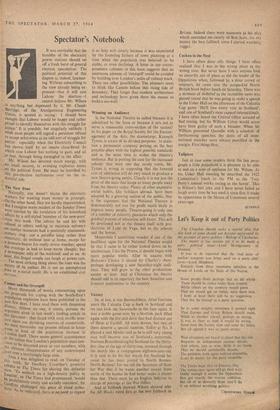Winning an Audience
Is the National Theatre so called because it is subsidised by the State or because it sets out to serve a reasonable cross-section of the nation? In his paper to the Royal Society for the Encour- agement of the Arts, the dramaturge, Kenneth Tynan, is aware of its divided purposes: to main- tain a permanent company putting on the best possible plays with the highest possible standards and at the same time to widen the theatre's audience. But in putting the case for the increased subsidy that must one day surely come, Mr. Tynan is wrong in supposing that the lowered cost of admission will do very much to produce a new theatre-going public. Clearly it is not just the price of the seats that keeps so many people away from the theatre today. Plenty of other expensive social habits, like holidays abroad, have been adopted by a growing section of the public. Nor is the argument that the National Theatre is demonstrably not run for profit much likely to impress many people. Theatre-going is only one of a number of minority pleasures which only the gradual process of education will foster. This will be developed not in the theatre itself with pro- ductions of Lope de Vega, but in the schools and the homes.
Meanwhile I sometimes wonder if one of the healthiest signs for the National Theatre would be that it came to be rather looked down on by intellectuals. Like the Proms, it should begin with more popular works. After its success with Hobson's Choice it should try Charley's Aunt, perhaps developing a new Saturday-night audi- ence. They will grow to the other productions sooner or later. And at Christmas the. theatre should add to its repertory the best, bawdiest and funniest pantomime in the country.


































 Previous page
Previous page